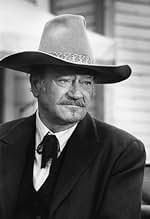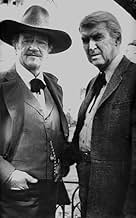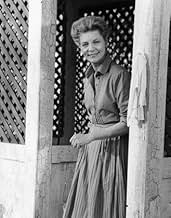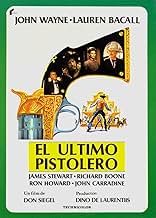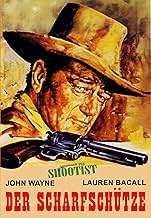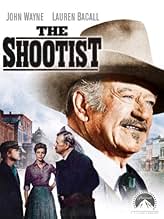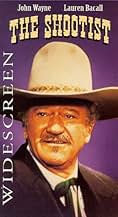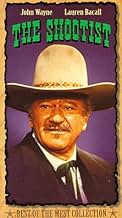Un as de la gâchette mourant passe ses derniers jours à essayer de trouver comment mourir en souffrant le moins possible et en restant aussi digne que possible.Un as de la gâchette mourant passe ses derniers jours à essayer de trouver comment mourir en souffrant le moins possible et en restant aussi digne que possible.Un as de la gâchette mourant passe ses derniers jours à essayer de trouver comment mourir en souffrant le moins possible et en restant aussi digne que possible.
- Réalisation
- Scénario
- Casting principal
- Nommé pour 1 Oscar
- 1 victoire et 5 nominations au total
- Girl on Streetcar
- (as Melody Thomas)
- Man Outside Metropole
- (non crédité)
Avis à la une
The film is about both endings and new beginnings, so it is significant that the action takes place in the first month of a new century. January 1901 marked not only the beginning of a century, but also the end of an era, because it was the month in which Queen Victoria died; this event is referred to several times in the film. The days of the `Old West' were also coming to an end; under the influence of new inventions such as the motor car and the telephone (both of which appear in the film) it was becoming a quieter and less lawless place.
The time of year is significant in another way. A film which is about both the end of a man's life and the end of an era will inevitably be elegiac in tone, and the standard way of making it would be to film it in autumn, with plenty of shots of falling leaves and grey, misty skies. Don Siegel, however, takes an alternative approach, setting the film during a brief period of brilliant winter sunshine and mild weather known as a `false spring'. This not only provides some strikingly beautiful images, but also has a double symbolic meaning. For Books and for the Old West it is winter; but for the younger generation, spring is coming. One of the most touching features of the film is the relationship between Books and Gillom, the son of his landlady. Gillom idolises Books and treats him as a hero; Books, in the last days of his life, treats the young man as the son he never had and tries to teach him that there is a better way than that of the gun. The Old West may be passing into history, but there are indications that the New West, although it may be less picturesque, will be a better place in which to live. If winter comes, can spring be far behind?
The film itself also turned out to mark the end of an era in more ways than one. Although there is some doubt whether Wayne actually knew in 1976 that his cancer had returned, we now of course know that it was to be his last film and that he was to die about three years later, and this knowledge makes the film all the more poignant. It was also one of the last of the great Westerns. Although the genre had seemed in reasonable health in the early seventies, it was to suffer, for various reasons, a sharp decline in the second half of the decade and throughout the eighties. Perhaps the standard conventions of the genre had become so familiar that they seemed like clichés; perhaps the post-Vietnam generation had no time for films which often had as their themes honour, glory and courage. (It is notable that the patriotic war film underwent a similar decline at the same time). Certainly, the financial failure of `Heaven's Gate' made investors wary of backing westerns. Even Clint Eastwood, who had seemed to be the heir-apparent to Wayne's crown as King (or should that be Duke?) of the West, abandoned the genre for a time, although he was to return to it triumphantly with `Unforgiven' in the early nineties.
Wayne's great strength as an actor was his ability to convey the tough but honourable man of action. Both these qualities are present in `The Shootist', but he was able to add further qualities, pathos and as sense of a less honourable past. Although Books is hard-bitten and irascible, he is also fundamentally decent, resorting to force only in self-defence. He can show pity- early in the film he spares the life of a villain who tries to rob him at gunpoint, even though he has the man at his mercy. Nevertheless, we are always well aware that he did not gain his fearsome reputation by a scrupulous observance of the Ten Commandments; although this is not an overtly religious film, the story of his last days can be seen as the story of his search for atonement as well as for dignity. In his last film, Wayne achieves one of his greatest performances; it is remarkable that he was not even nominated for an Oscar.
The other performance that stands out is that of Ron Howard as Gillom. Howard, of course, is now best known as a director; if his acting career is remembered it is for his role that bland TV series `Happy Days'. Nevertheless, he was also capable of giving good contributions in films (`American Graffiti' is another example), and here he brings a touching youthful innocence to the part. There are also good contributions from James Stewart as the gentle, dignified doctor and from Lauren Bacall as Gillom's mother. (She has the unusual Christian name Bond, possibly symbolic of the close ties that grow between her and Books at the end of his life).
`The Shootist' is a marvellous film, sombre and elegiac, and yet at the same time with a message of hope. A fitting end to Wayne's career. 9/10.
**** (out of 4)
John Wayne, in his final film, plays a dying gunfighter who goes to a small town for some final rest but ends up going up against a group of men who won't let him die in peace.
Many believe that Wayne made this film, like the character, knowing that he was dying but apparently that wasn't the case but even so he managed to get talent like Lauren Bacall, Ron Howard, Hugh O'Brien, John Carradine, Richard Boone, Scatman Crothers and James Stewart to appear. Apparently Wayne had more filmed lined up before his death three years later but none of them ever came to be and that's probably a good thing because THE SHOOTIST really sends the legend out on a very high note.
I say this because so many legends end their careers with bad or at best mediocre movies but at least the biggest movie star in the history of cinema got to go out on top. A lot of the greatness here has to go to Wayne who is simply wonderful in the role of the dying man. I think Wayne's heartfelt performance here also adds to the myth that he knew he was dying because you really do feel as if you're watching someone on their final days. It's quite a tender performance but that toughness is still there and believable.
The supporting players all fit their roles nicely and there's no question it's very nice seeing Wayne act with them one final time. Director Don Siegel does a very good job at keeping the film moving in between the action scenes and he does a very nice job with the more quiet moments. THE SHOOTIST is also a throwback to the Westerns that Wayne was making earlier in his career but there's no doubt that the actor got to go out on top, which is certainly fitting.
At the period in which this film is set, gunslingers or `shootists' were soon to go the way of the horse and buggy. The queen (Victoria) had just died. Electricity, modern plumbing, modern commerce, modern transportation, and creature comforts were beginning to take over (check out the electric ceiling fans and mosaic tiles in the saloon!). Forward to real life'. It is 1976. One by one, the mythic legends created by dime novels and Hollywood movies are being demystified. From Billy The Kid to Buffalo Bill, to Bonnie and Clyde, audiences have been shown for over decade how legends have always been manufactured. There are some who may see this demystification as a negative thing, but when people start adoring soldiers, celebrities and gangsters as something more than human, it's time to set the record straight. That's what all the best films of the seventies did. They broke the myths but they did not break the spirit, for what they did was let US, not the supermen on the screen, become the heroes. We could be afraid, old, young, ill, or weak, and we could feel pain and humiliation. In the process of confronting our limitations we become stronger. To be a stronger human being is to become civilized. Like this film shows us, we CAN reject the gun and join civilization. This film is John Wayne's gift to us. He is enabling us to grow up, to look at the past with respect, but to face the future with responsibility. His John Books is worth more to us than all his superheroes put together. We're all gonna die, we're all afraid, and pain is very, very real. It is in the process of surrendering to this fact with dignity and humility that we in a sense become immortal. To try to live as a superman is to die a fool. Only cowards (and very dangerous people) embrace myths over reality. That dainty red pillow has made The Duke sit very tall in his saddle indeed!
Le saviez-vous
- AnecdotesJames Stewart agreed to play a cameo role in the film only because John Wayne had specifically requested him. His brief screen time proved to be rather difficult. The bad acoustics of the huge, hollow sound stages worsened his hearing difficulties, and he stayed by himself most of the time. He and Wayne muffed their lines so often in the main scene between them that director Don Siegel accused them of not trying hard enough. Wayne's reply was a variation on an old John Ford line, advising the director, "If you'd like the scene done better, you'd better get a couple of better actors." Later on, the star told friends that Stewart had known his lines, but hadn't been able to hear his cues, and that in turn had caused his own fumbling.
- GaffesBooks' hair (John Wayne's toupee) goes from being parted on his left to his right then back to his left after he tells Marshal Thibido he's a dying man when they first talk in Books' room.
- Citations
Gillom Rogers: [first lines, voiceover] His name was J.B. Books, and he had a matching pair of 45's with antique ivory grips that were something to behold. He wasn't an outlaw. The fact is for a while he was a lawman. Long before I met Mr. Books, he was a famous man. I guess his fame was why somebody or other was always after him. The wild country had taught him to survive. He lived his life and herded by himself. He had a credo that went:
John Bernard Books: I won't be wronged, I won't be insulted, and I won't be laid a hand on. I don't do these things to other people, and I require the same from them.
- ConnexionsFeatured in Sneak Previews: The Top Ten Films of 1976 (1977)
- Bandes originalesWillow, Tit Willow
Music by Arthur Sullivan
Lyrics by W.S. Gilbert
Performed by John Wayne & Lauren Bacall
Meilleurs choix
- How long is The Shootist?Alimenté par Alexa
Détails
Box-office
- Montant brut aux États-Unis et au Canada
- 8 091 910 $US
- Montant brut mondial
- 8 091 910 $US
- Durée1 heure 40 minutes
- Couleur
- Mixage
- Rapport de forme
- 1.85 : 1
Contribuer à cette page



